Finally, I got an Interview Call!
Though it’s a good thing it is not equal to getting a Job!
After applying for a job post, our resume undergoes many scrutinization tests. According to a study made by Glassdoor, an average job opening attracts 250+ resumes, but only 2% of them were called for an Interview. Though selected for an Interview, navigating it can be a challenging one especially answering tricky questions. In that Journey make sure you don’t say these 4 things to the recruiters. In this interview tips blog, I will help you to answer some of the tricky questions effectively.
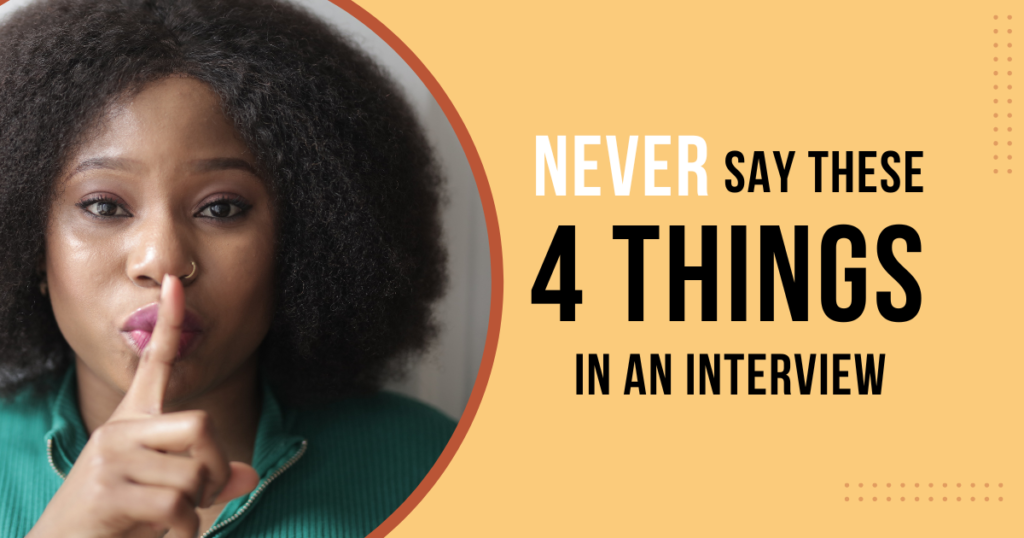
Interview Tip 1: Answering Tricky Questions
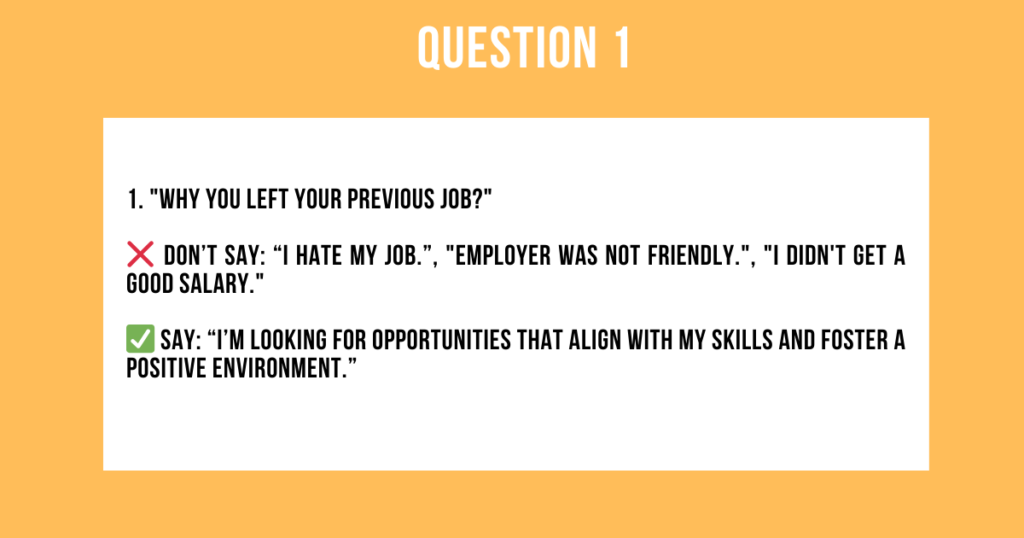
1. “Why You Left Your Previous Job?”
❌ Don’t say: “I hate my job.”, “Employer was not Friendly.”, “I didn’t get a Good Salary.”
✅ Say: “I’m looking for opportunities that align with my skills and foster a positive environment.”
Employers always expect their candidates to be professional and forward-thinking. Making Negative comments about your previous job or employer creates a negative impression about you. Instead, focus on your desire for professional growth, and better alignment with your skills, and expect a positive work culture.
Thus when you asked about the reason behind leaving the previous job, frame your response in a way that highlights your professional aspirations and the values you bring to a new role. Here the best Interview tip I will give you is to Avoid focusing on the negatives, and to focus on what are the gains you are expecting for the new role. For example, you can say you are looking for opportunities that offer you more growth potential and a more collaborative environment.
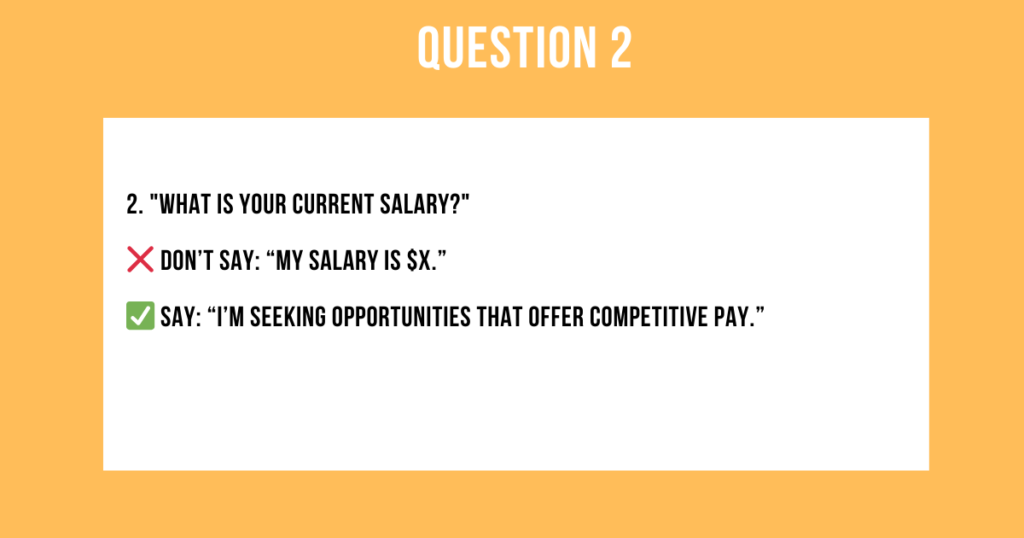
2. “What is your Current Salary?”
❌ Don’t say: “My salary is $X.”
✅ Say: “I’m seeking opportunities that offer competitive pay.”
One of the tricky processes in the interview arena is to discuss about the salary. Saying your exact salary can be a disadvantage, it may set a bar or it may make you seem too expensive. Instead, point your interest in a competitive salary based on your skills and experience, and hint that you are open to negotiation and focus on finding a mutually beneficial agreement.
If they ask about your current salary, answer the question carefully. Providing a specific number can set a bar to the negotiation process limiting your earning potential. Instead, express your interest in providing fair and competitive compensation based on your experience and the value you give to the company.
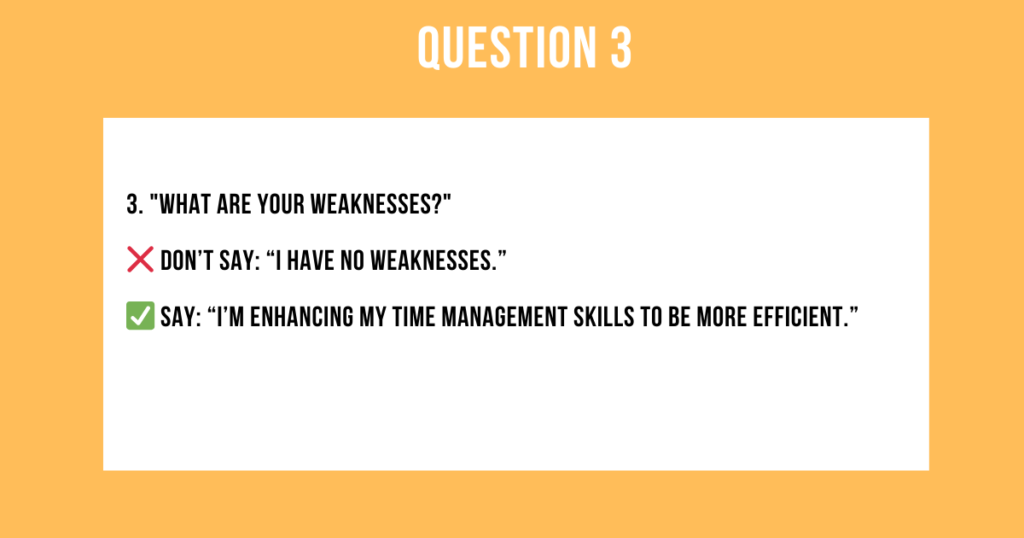
3. “What are your Weaknesses?”
❌ Don’t say: “I have no weaknesses.”
✅ Say: “I’m enhancing my time management skills to be more efficient.”
For some questions, employers always like to test the candidate’s credibility. This is one such question because the employer knows human beings have their own weaknesses. The fact is that whether the candidate is accepting and showing his credibility or not. If you claim that you have no weakness it may be considered as a dishonest answer. Instead, Choose a manageable real-time weakness and show your willingness to rectify it. This shows your proactive approach towards growth.
Another important thing is while discussing about your weaknesses, it is important to maintain a balance between honesty and positivity. Choose a weakness that is relevant to your job but not affecting your performance. Also, explain the measures you are taking to improve this arena and the growth you have created. This will show your commitment towards learning.
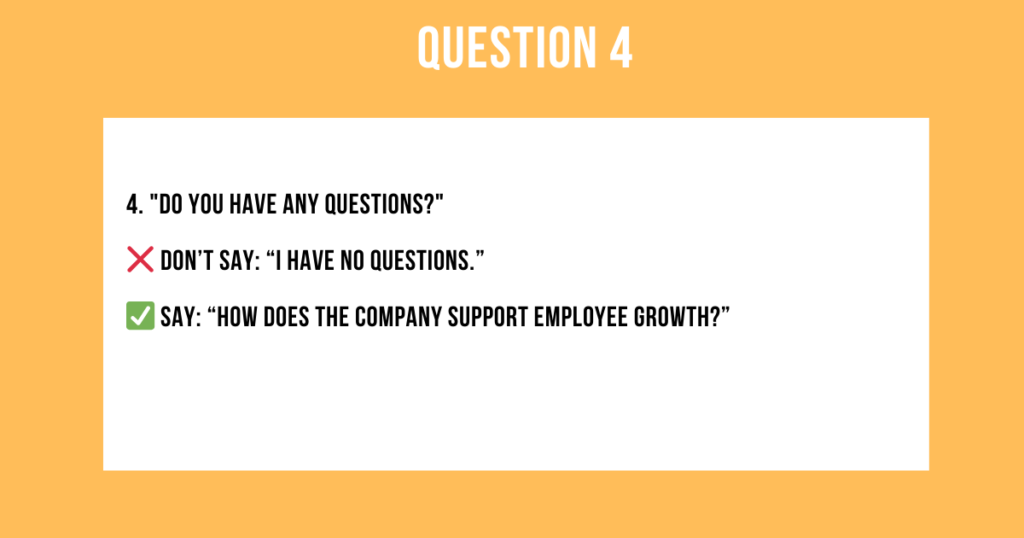
4. “Do you have any questions?”
❌ Don’t say: “I have no questions.”
✅ Say: “How does the company support employee growth?”
After listening to a lecture, if you don’t have any questions, it states that you didn’t understand the concept completely. In the same way, if you don’t ask any questions after the interview it says that you have no interest in the role and the company. Thus, When an interviewer asks if you have any questions, it is a chance to show your interest in the role and the company. Ask about the company’s support for employee development, growth opportunities and workspace culture. This showcases your enthusiasm and forward-thinking attitude.
Apart from that, it shows you have done enough homework to know about the company, and you are eager to learn more about the company’s values, culture and opportunities for growth. This will list your profile as unique from other candidates.
Here are the Additional Interview tips:
- Research about the Company: Make note of the company’s mission, vision and values. Researching the company’s recent developments and showcasing them in the interview can make a significant difference.
- Practice Common Questions: Apart from the 4 questions listed above, prepare answers for some more common questions.
- Show Enthusiasm: Employers appreciate candidates who are genuinely excited about the opportunity.
- Follow up: Sending a thank you mail after the interview is also a sign of interest.
- Dress Appropriately: Dressing Appropriately for the interview shows your respect towards the company.
Interview Tip 2: The Importance of Follow-Up
Sending a follow-up email after the interview is a simple yet effective way to leave a lasting impression. It shows that you are courteous, professional, and genuinely interested in the position. Here the best Interview tip is to design a well-crafted follow-up email can reinforce your enthusiasm for the role and remind the interviewer of your strengths.
Crafting the Perfect Follow-Up Email
- Express Gratitude: Thank the interviewer for their time and the opportunity to interview for the position.
- Reiterate Interest: Reinforce your enthusiasm for the role and the company.
- Highlight Key Points: Briefly mention any key points discussed during the interview that highlight your suitability for the position.
- Offer Additional Information: If there’s any additional information you forgot to mention during the interview, include it in your follow-up email.
- Be Concise: Keep your email brief and to the point, while still covering the essential points.
FAQs
Q: Why is it important to avoid negative comments about your current job during an interview?
A: Negative comments can make you appear unprofessional and difficult to work with. Focus on positive reasons for seeking new opportunities, such as professional growth and alignment with your skills.
Q: How should I handle questions about my current salary?
A: Emphasize your interest in a competitive salary that reflects your skills and experience, avoiding specific numbers until later in the negotiation process. This leaves room for negotiation and ensures fair compensation. Reading the Career Guidance Blogs and the interview tips provided will make you to answer this question the best.
Q: What’s a good way to discuss my weaknesses in an interview?
A: Choose a real, manageable weakness and explain the steps you’re taking to improve it. This demonstrates self-awareness, a willingness to develop, and a proactive approach to personal growth.
Q: How to make an perfect resume to apply in an interview?
A: To create a perfect resume for an interview, ensure it is ATS-friendly by using simple formatting, relevant keywords, and clear headings. Making it with Chat GPT is my suggested interview tip. A key interview tip is to tailor your resume to the job description, highlighting your most relevant skills and achievements.
Q: What kind of questions should I ask in an interview?
A: Ask about the company’s support for employee development, growth opportunities, workplace culture, and any specifics about the role that you’re curious about. This shows your genuine interest in the position and the organization.
